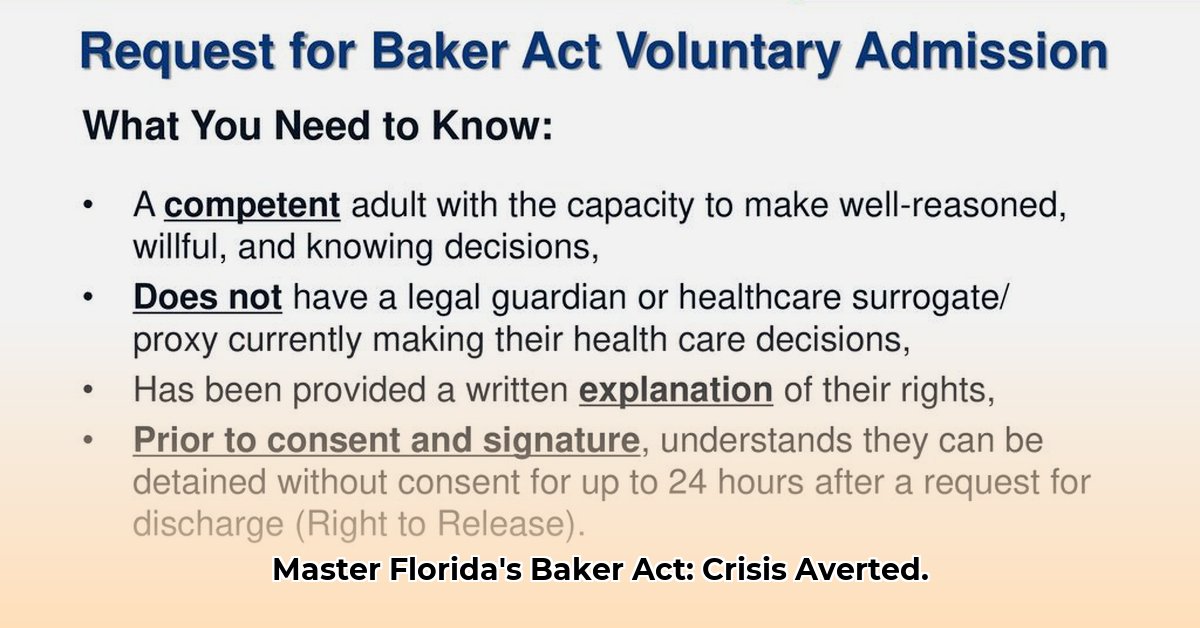
Baker Act Paperwork: Navigating Florida's Mental Health Crisis System
Florida's Baker Act provides a critical safety net for individuals experiencing mental health emergencies, enabling temporary, involuntary hospitalization. However, the process, especially the associated paperwork, presents significant challenges. This article explores these challenges, focusing on transparency, stigma reduction, and improved access to care, ultimately aiming to enhance the effectiveness of Florida’s mental health crisis response system.
Understanding the Baker Act: More Than Just Paperwork
The Baker Act facilitates emergency mental health care, triggered when an individual poses a danger to themselves or others due to a mental health crisis. Initiated by various individuals (doctors, police, family members), the process involves petitions (key Baker Act paperwork), professional evaluations, hearings, and – ideally – a path to treatment and recovery. Accuracy in paperwork is paramount for legal compliance and fairness. The process focuses on providing immediate assistance, akin to emergency medical care for physical injuries, ensuring critical care even when self-advocacy is compromised.
Florida's Baker Act Data Dashboard: A Step Towards Transparency
Florida's new data dashboard represents a significant step towards transparency, offering valuable insights into Baker Act usage patterns and resource allocation needs. Analyzing this data allows us to identify areas requiring enhanced resources, improving the system’s efficiency. However, the dashboard's current limitations highlight the need for ongoing refinement and data expansion. The accuracy of the Baker Act paperwork significantly impacts the dashboard's reliability, underscoring the importance of accurate record-keeping. How can we further enhance the data dashboard's capabilities for a more comprehensive understanding of the Baker Act's effectiveness?
Confronting Stigma: A Major Hurdle to Effective Mental Healthcare
Stigma surrounding mental illness is a significant barrier to timely intervention. Fear of judgment often prevents individuals from seeking help, leading to delayed treatment and more severe crises. This creates a cycle where stigma hinders access to care, resulting in an increased need for Baker Act interventions. How can we effectively counter this pervasive social stigma to encourage individuals to seek help proactively?
Stakeholder Collaboration: Shared Responsibility for Improvement
Improving the Baker Act system demands collaborative action. Each stakeholder plays a vital role:
| Stakeholder | Short-Term Actions | Long-Term Goals |
|---|---|---|
| Florida Department of Children and Families (DCF) | Enhance the data dashboard; launch targeted public awareness campaigns. | Develop comprehensive stigma-reduction programs; conduct regular evaluations and implement data-driven adjustments. |
| Mental Health Providers | Standardize record-keeping; enhance Baker Act training for staff. | Advocate for increased funding; actively participate in community support program development. |
| Law Enforcement | Improve crisis response training, emphasizing de-escalation techniques. | Develop specialized mental health units; establish clear communication protocols with mental health professionals. |
| General Public | Support public awareness initiatives; foster supportive community environments. | Promote understanding and empathy through education and community engagement; actively challenge stigma. |
This coordinated effort is crucial for impactful and sustainable change. The quality of Baker Act paperwork is pivotal to this collaborative success.
Risk Assessment and Mitigation Strategies
Several key risks affecting the Baker Act system require targeted mitigation strategies:
| Risk Factor | Likelihood | Impact | Mitigation Strategy |
|---|---|---|---|
| Inaccurate Baker Act paperwork | High | Very High | Enhance training; implement rigorous quality control measures; standardize documentation processes. |
| Stigma-Driven Underutilization | High | Very High | Launch comprehensive, multi-channel public awareness campaigns. |
| Inadequate Resources | Medium | High | Advocate for increased funding for crisis services; expand the mental health workforce. |
| Geographic Disparities | Medium | High | Develop mobile crisis units; expand community-based services in underserved areas. |
| Lack of Data Integration | Medium | High | Improve data sharing across stakeholders; establish a centralized data management system. |
Addressing these risks directly will strengthen the system's resilience and equity. Accurate Baker Act paperwork serves as a foundational element in effective risk mitigation.
Conclusion: A Path Towards a More Effective Crisis Response System
Improving Florida's Baker Act system requires a multifaceted approach that prioritizes transparency, addresses stigma, and fosters collaboration among all stakeholders. By leveraging data-driven insights, implementing comprehensive mitigation strategies, and cultivating a culture of understanding and support, we can create a more effective and equitable mental health crisis response system. The accurate and efficient processing of Baker Act paperwork plays a vital role in achieving this critical goal. The future of Florida's mental health crisis response depends on our collective commitment to continuous improvement.